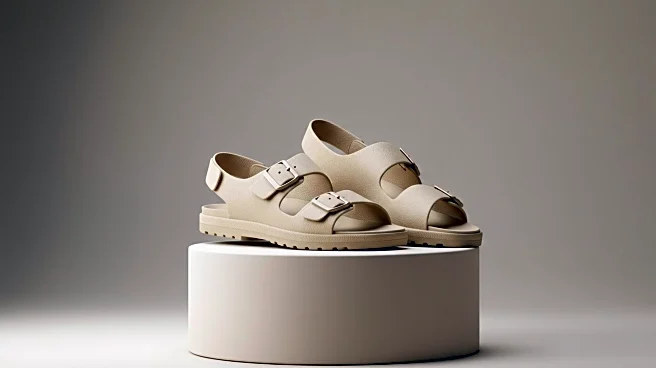What is the story about?
What's Happening?
Birkenstock, the German sandal manufacturer, has exceeded third-quarter profit expectations due to robust demand for its full-price footwear, particularly its suede leather closed-toe Boston clogs. Despite facing a 15% U.S. tariff on European imports, the company has managed to maintain its annual margin forecast. The demand for Birkenstock's products has remained strong among affluent consumers, even with price increases, leading to a 100 basis point increase in its gross margin to 60.5%. The company produces 95% of its shoes in its own factories in Germany and plans to counteract the tariff impact through strategic price increases, cost management, and inventory control. Birkenstock's sales in the Americas grew by 16% after accounting for currency fluctuations, although this was a slight decrease from the previous quarter's 20% growth. The company reported quarterly revenue of €635 million, slightly below expectations, but its adjusted earnings per share surpassed estimates.
Why It's Important?
Birkenstock's ability to maintain profitability and growth despite the imposition of U.S. tariffs highlights the resilience of luxury brands in the face of economic challenges. The company's strategy of managing costs and adjusting prices has allowed it to sustain demand and protect its margins. This performance is indicative of a broader trend where high-end brands continue to thrive due to their affluent customer base, who are less sensitive to price changes. The success of Birkenstock and similar brands like Ralph Lauren and Deckers Outdoor suggests that the luxury goods sector remains robust, even as other segments of the retail market face pressures from economic uncertainties and trade policies. This resilience could influence other companies in the industry to adopt similar strategies to mitigate the impact of tariffs and currency fluctuations.
What's Next?
Birkenstock is expected to continue focusing on managing its cost structure and inventory to navigate the ongoing tariff challenges. The company has maintained its fiscal 2025 revenue growth forecast at the high end of 15% to 17% and expects its adjusted EBITDA margin to remain stable. As the U.S. tariff situation evolves, Birkenstock and other European luxury brands may need to further adapt their strategies to maintain their competitive edge in the American market. Additionally, the company's ongoing efforts to combat counterfeit products, as seen in its recent legal actions in India, may also play a role in protecting its brand value and market share globally.















